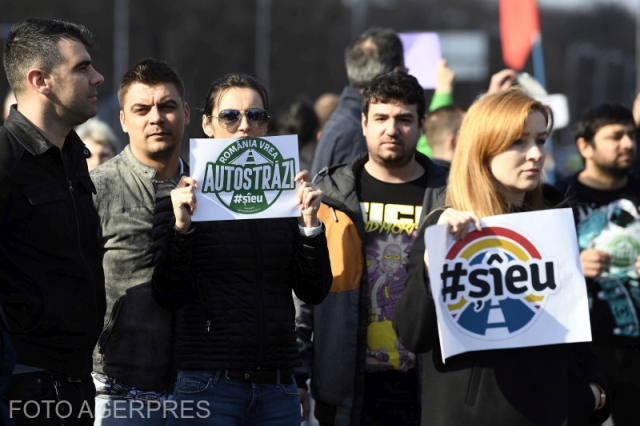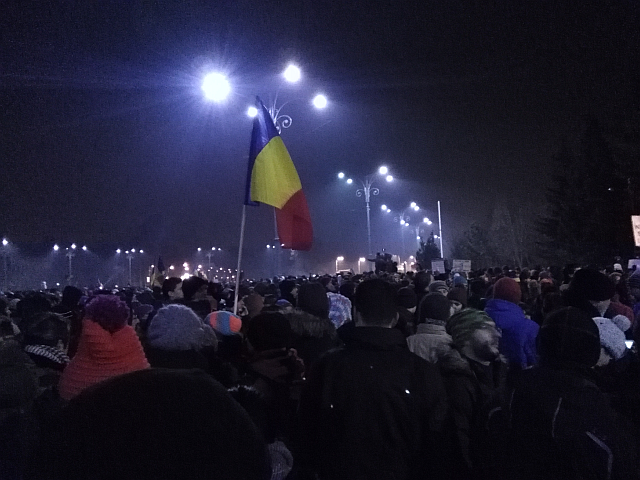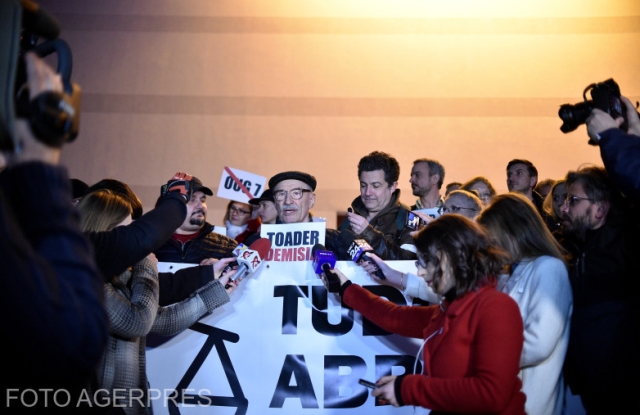Die rumänischen Taxi-, Minibus- und Reisebusfahrer protestieren. Zwei Tage in Folge, am Mittwoch und Donnerstag, riefen Tausende Transporteure ihre Beschwerden auf dem Platz vor dem Regierungssitz in der Bukarester Stadtmitte. Ihre Unzufriedenheit ist eindeutig: Die zwei Eilverordnungen über die Personenbeförderung, die von der Exekutive versprochen wurden und voller Spannung erwartet werden, sind zur Zeit blockiert.
Am Mittwoch sammelten sich zahlreiche Mitglieder der rumänischen Föderation für Personenbeförderung FORT, mitsamt ihrer Wagen, auf dem Platz vor dem Regierungssitz in Bukarest. Die protestierenden Transporteure äußerten ihre Ansprüche auf die Personenbeförderung mit Minibussen und Reisebussen auf nationaler und Landkreisebene. Die derzeit geltenden Verträge laufen im Juni aus, und die Unternehmen müssen über neue Minibusse und Reisebusse verfügen, um an den neuen Ausschreibungsverfahren teilnehmen zu können. Die protestierenden Transporteure verlangten, dass sie von dieser Verpflichtung befreit werden. Das Ziel des FORT-Protestes wurde erreicht: Die Regierung versprach, die erforderlichen Gesetzesänderungen in naher Zukunft, vielleicht sogar nächste Woche, durchzuführen.
Der andere große Gewerkschaftsbund der in Rumänien authorisierten Transporteure und Personenbeförderer, COTAR, protestierte am Donnerstag vor dem Regierungssitz. Die Demonstranten blockierten teilweise den Verkehr mit ihren Taxis. Der Gewerkschaftsbund COTAR vertritt die Taxifahrer, die fordern, dass das Gesetz über Taxifahren geändert wird. Dieses Versprechen hat unsere Aktionen drei Jahre hintereinander gestoppt. Bis wir die versprochene Eilverordnung der Regierung in Kraft treten sehen, geben wir die angekündigten Protestdemonstrationen nicht auf”, sagte der COTAR-Präsident Vasile Stefanescu.
Die COTAR-Gewerkschaftsmitglieder klagen, die Regierung habe sie getäuscht und ihnen versprochen, eine Notverordnung zur Bekämpfung der Piraterie beim Transport von Personen zu erlassen. Dies habe die Exekutive aber nicht getan. Es geht um den Eilverordnungsenttwurf, der am 1. März in der öffentlichen Debatte des Entwicklungsministeriums in die Wege geleitet wurde und die Formulierung “wiederholt” aus dem Taximetriegesetz streichen sollte.
Warum wollen die Taxifahrer dies erreichen? Laut dem jetzigen Gesetzestext können Autofahrer, die im Personenverkehr Piraterie betreiben, nur dann bestraft werden, wenn sie “wiederholt” gegen das Gesetz verstoßen. Der Satz ist unklar und die Behörden haben keine Datenbanken, aus denen hervorgehen sollte, dass der sanktionierte Fahrer wiederholt gegen das Gesetz verstößt. Nach Ansicht der Taxifahrer können Piraten in der Personenbeförderung ruhig Geld verdienen, ohne Steuern zu zahlen, ohne sich zu akkreditieren und ohne Lizenz. In der jetzigen Form ermöglicht das Gesetz den Unternehmen im Bezirk Ilfov in der Nähe von Bukarest, in der Hauptstadt tätig zu sein, obwohl sie keine vom Rathaus erteilten Genehmigungen haben. Dann geht es auch um Uber und Taxify, die zur Zeit den klassischen Taxiunternehmen eine ernstzunehmende Konkurrenz machen. Die Mitarbeiter der klassichen Taxiunternehmen wurden oft von ihren Kunden kritisiert, wegen der schlechten Transportbedingungen und weil sie illegal über den Tarif für eine Fahrt aushandeln.
Obwohl sie sich entschuldigt hatten, haben die Taxi-, Minibus und Reisebusfahrer durch ihre Proteste sowohl in Bukarest als auch auf den rumänischen Landstraßen ein Verkehrschaos verursacht. Die protestierenden Transporteure warnten aber, dass die authorisierten Personenbeförderungsunternehmen wöchentlich große Kundgebungen veranstalten werden, wenn die Regierung die gemeldeten Probleme nicht löst.
Auch die Gewerkschafter von der Bukarester U-Bahn Metrorex sind unzufrieden und drohen mit Protesten. Sie gaben bekannt, dass sie am Donnerstag und Freitag eine zweistündige Mahnwache vor dem Transportministerium in Bukarest halten. Sie beschuldigen die Behörden, gegenüber den Sicherheitsproblemen der U-Bahn gleichgültig zu bleiben. Die Metrorex-Gewerkschafter erinnerten an den Vorfall Anfang dieses Jahres in einem U-Bahn-Depot, als zwei leere Waggons von den Schienen gesprungen waren und erklärten, dass solche Vorfälle bei 13 von den insgesamt 80 Metrorex-Zügen passieren könnten. In diesem Zusammenhang sagte der Transportminister Răzvan Cuc, er sei überzeugt, dass die U-Bahn-Züge kein Problem hätten; der versteckte Zweck der Gewerkschaftsklagen sei das Bewirtschaften der unterirdischen Geschäftsräume, so der Transportminister. Bis jetzt wurden die betreffenden Geschäftsräume von der Metrorex-Gewerkschaft verwaltet; jetzt sollen sie durch ein transparentes Ausschreibungsverfahren vergeben werden.










